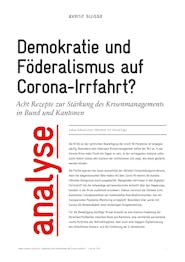Since the outbreak of the Covid-19 virus in the first quarter of 2020, the authorities at federal and cantonal level have been under considerable pressure to act. Executive powers have been increased (reducing the role of the legislature) and centralized. Judging by the frequent accusations that federalism is a handicap when it comes to combating the pandemic, for many people this process has obviously gone too far. Do they have a point?
In its new analysis, Avenir Suisse formulates eight recommendations as to how federal crisis management in response to the pandemic could be optimised, and the areas where there’s potential to enhance the division of roles between the different levels of government. It takes a critical look at the legislative basis of the pandemic response and the interplay so far between the executive and parliament. Instead of transferring even more powers to the federal government, it suggests that a clearer allocation of responsibilities between the federal and cantonal levels would be more advisable.
There also have to be considerable advances in digitalization. So far, the fact that digital technology has not sufficiently penetrated the public sector has been one of the biggest obstacles to guaranteeing direct democracy and parliamentary control, also in times of crisis.






